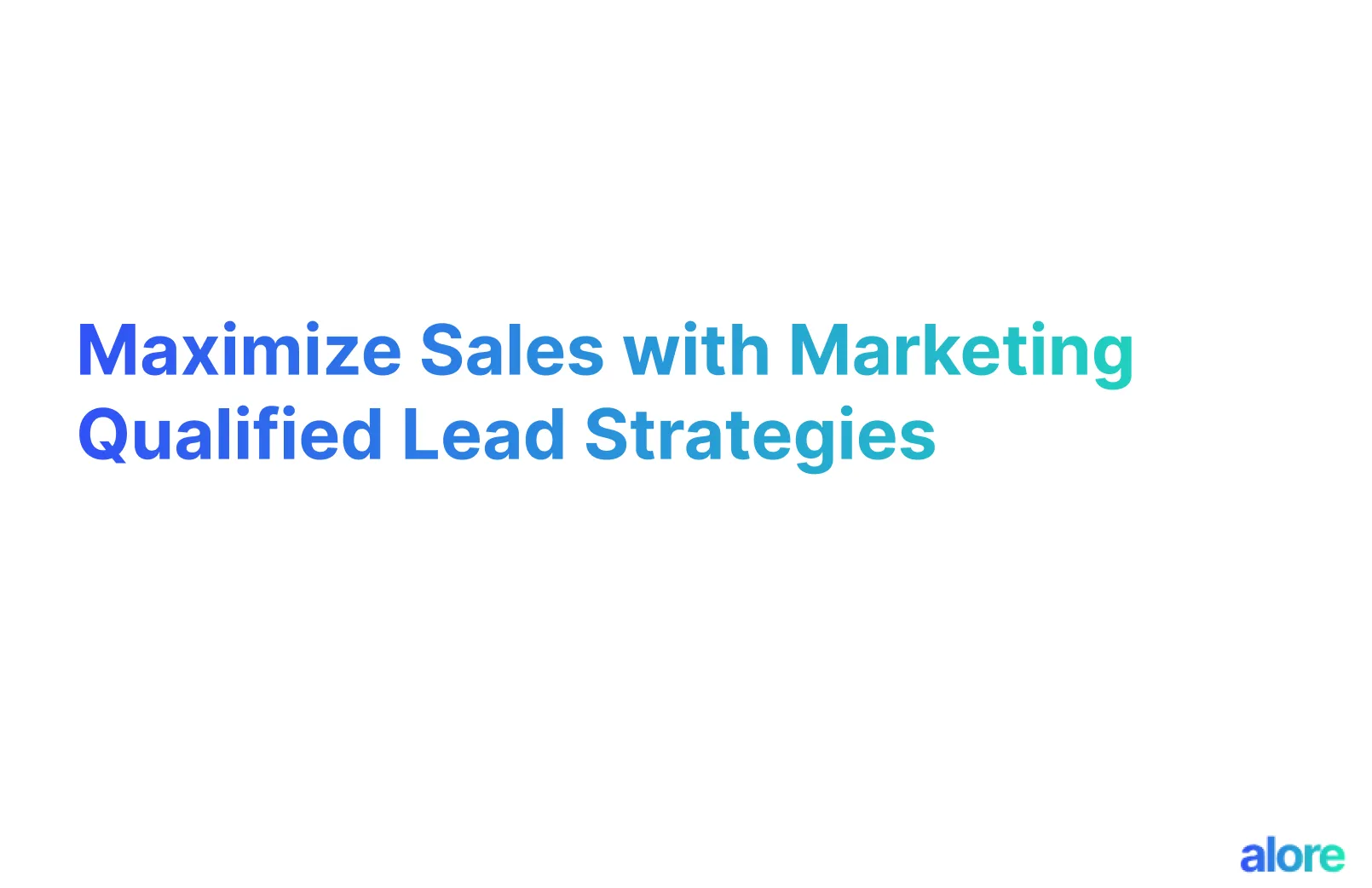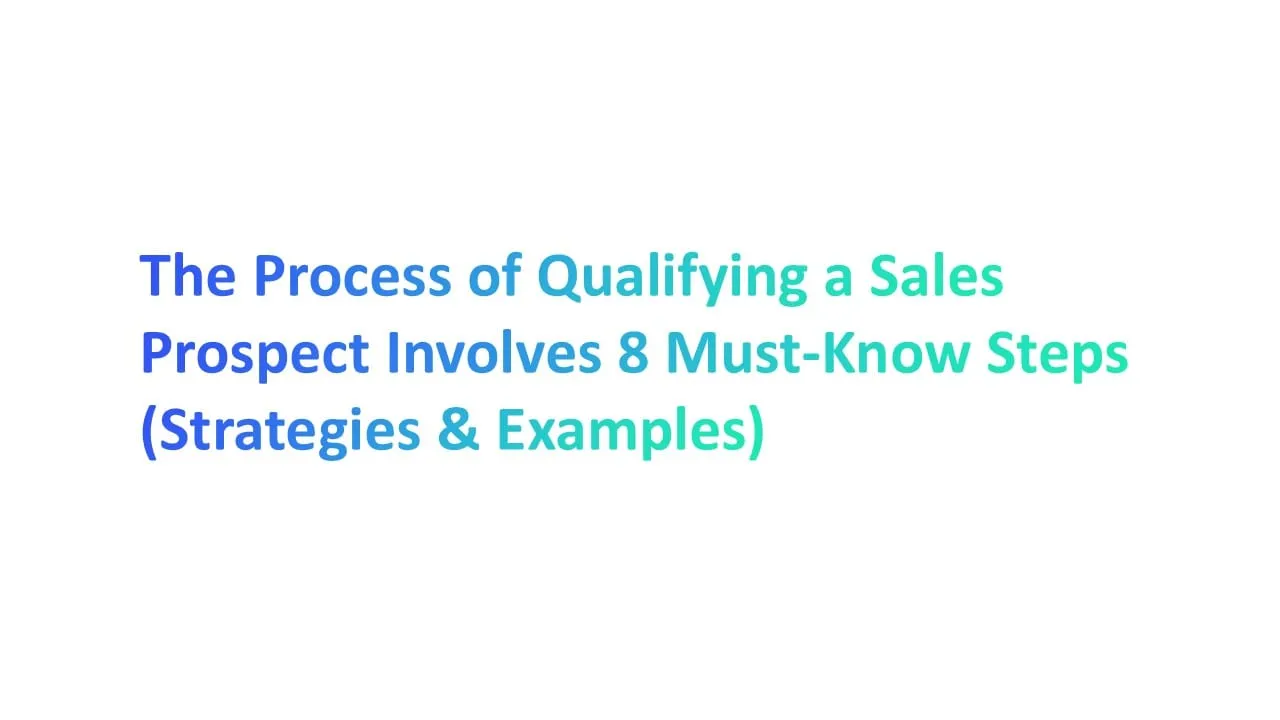Defining Marketing Qualified Leads: Criteria and Significance
What is a Marketing Qualified Lead?
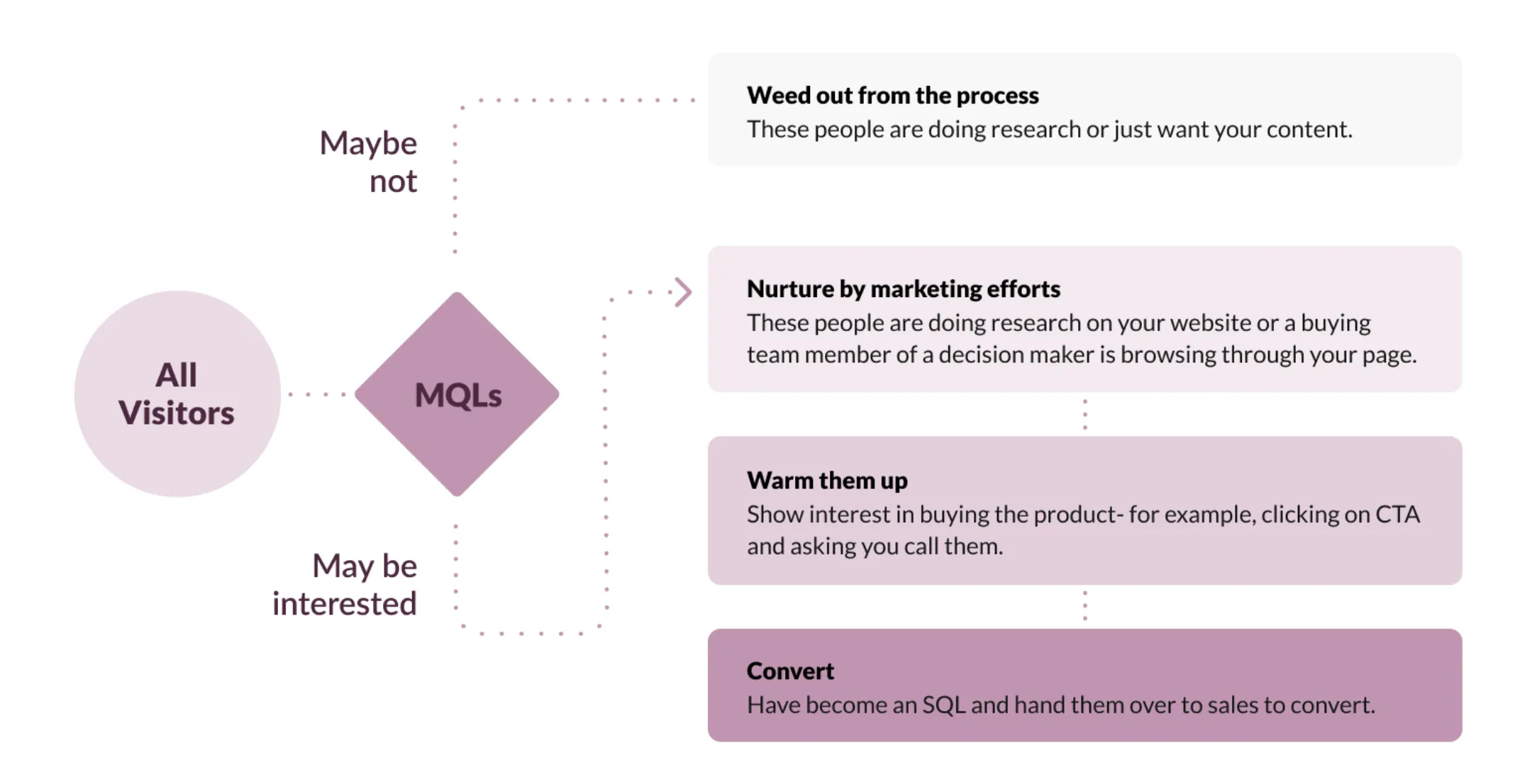
Understanding a Marketing Qualified Lead (MQL) is crucial for any sales and marketing team aiming to enhance their lead generation efforts.
An MQL represents a prospective customer who, based on certain criteria and actions, is deemed more likely to become a paying customer compared to other leads.
Unlike a general lead, an MQL has shown interest in your product or service, indicating a higher likelihood of moving through the sales funnel.
Criteria for Identifying Marketing Qualified Leads
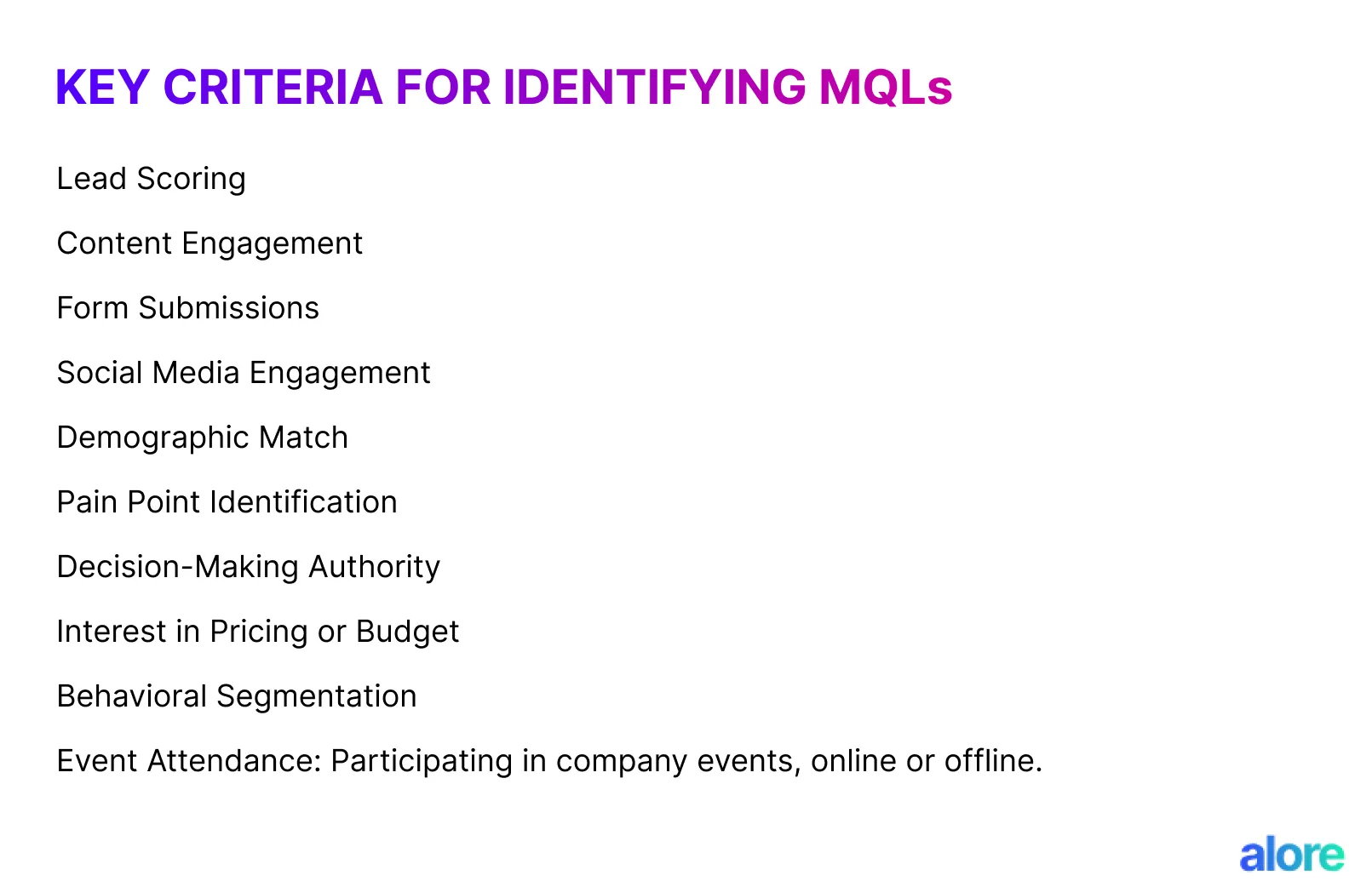
Identifying a Marketing Qualified Lead requires a set of specific criteria tailored to your company's unique sales process and customer profile.
These criteria often involve analyzing lead behavior, such as website interactions or responses to marketing efforts.
For instance, a lead repeatedly visiting your product pages or downloading content offers could be considered an MQL.
Key criteria for identifying an MQL include:
- Lead Scoring: Points assigned based on engagement activities like website visits and email interactions.
- Content Engagement: Downloading e-books, signing up for webinars, or spending significant time on key web pages.
- Form Submissions: Completing forms for gated content, indicating a higher level of interest.
- Social Media Engagement: Interaction with social media posts, such as likes, shares, or comments.
- Demographic Match: Aligning with target customer profiles based on job title, industry, or company size.
- Pain Point Identification: Expressing challenges or needs that align with the company’s solutions.
- Decision-Making Authority: Holding a position that suggests influence in purchasing decisions.
- Interest in Pricing or Budget: Indicating a budget range or inquiring about pricing information.
- Behavioral Segmentation: Falling into segments based on past interactions, indicating potential to advance in the sales funnel.
- Event Attendance: Participating in company events, online or offline.
The criteria should align with your overall sales goals and be regularly refined based on evolving sales trends and marketing-qualified lead actions.
The Significance of MQLs in the Sales and Marketing Ecosystem
In the sales and marketing ecosystem, MQLs play a pivotal role. They bridge the gap between general interest and potential sales, helping sales teams prioritize and personalize their outreach.
By focusing on MQLs, sales and marketing teams work more efficiently, targeting efforts toward leads with a higher conversion probability.
This alignment saves time and resources and increases the chances of revenue growth and successful customer acquisition.
The Role of Demographic Information and Lead Behavior in MQL Identification
Understanding Demographic Information:
Role in MQL Identification:
- Helps in segmenting the market: Different demographics have varied needs and pain points, allowing for more tailored marketing efforts.
- Enhances personalization: Knowing the demographics of a lead, like company size or job title, allows for customized communication, increasing the effectiveness of marketing strategies.
- Aids in predicting purchasing behavior: Certain demographic groups are more likely to purchase specific products or services, helping prioritize leads.
Why It's Important:
- Better targeting: Demographic data enables the marketing team to create content and campaigns that resonate more deeply with specific groups.
- Improved lead scoring: Demographics are a crucial component in assigning lead scores, which helps in identifying qualified leads.
- Enhanced sales process: Sales teams can use demographic information to understand potential customer challenges and tailor their sales approach.
Assessing Lead Behavior:
Role in MQL Identification:
- Indicates interest level: Repeated actions, like visiting a website or engaging with content, show a lead's interest in your offerings.
- Helps in gauging lead readiness: Certain behaviors, such as downloading a white paper or attending a webinar, suggest a lead is closer to making a purchasing decision.
- Provides insights into lead needs: By analyzing lead actions, you can understand their specific interests and pain points.
Why It's Important:
- Predicts conversion likelihood: Behavioral data gives an indication of how likely a lead is to convert into a paying customer.
- Facilitates effective lead nurturing: Understanding lead behavior allows marketing teams to nurture leads with appropriate and timely content.
- Enhances sales and marketing alignment: Shared insights into lead behavior ensure both teams are coordinated in their approach to lead management.
Aligning Sales and Marketing Teams on MQL Definition
The success of utilizing MQLs hinges on the alignment between sales and marketing teams. Both teams must agree on the definition of an MQL, ensuring that the leads passed from marketing to sales meet the agreed-upon criteria.
This alignment prevents miscommunication and ensures that both teams work towards a common goal.
Regular meetings and discussions about the MQL criteria and feedback from sales reps on lead quality further refine this process, making it more efficient and productive.
Lead Scoring: The Heart of MQL Identification

Lead Scoring Techniques for MQL Determination
Lead scoring is integral to the sales and marketing teams' strategy in identifying a Marketing Qualified Lead (MQL). This process is vital for enhancing the sales funnel's efficiency.
Key techniques include:
- Data-Driven Insights: Leveraging data from past sales qualified leads and marketing qualified leads helps identify traits common to successful conversions.
- Behavioral Analysis: Monitoring online behavior and engagement with marketing assets, such as email marketing campaigns or website interactions, is crucial. This insight is valuable for sales teams and marketing teams alike.
- Sales and Marketing Alignment: Regular collaboration between sales teams and marketing teams is essential to refine lead scoring criteria and ensure they align with the overall sales process.
Behavioral Insights and Engagement Level in Lead Scoring
Engagement level, a key component in scoring leads, involves:
- Content Interaction: Understanding how potential customers interact with content, such as blog posts or infographics, can signal interest.
- Email Engagement: The frequency and nature of a lead's interaction with promotional emails or drip campaigns offer valuable insights.
- Social Media Activity: Engagement on platforms like LinkedIn or Twitter can also be a strong indicator of a lead's interest and a part of the lead generation efforts.
Regularly Revisiting Your Lead Scoring Model
Maintaining an effective lead scoring system requires the following:
- Ongoing Evaluation: Regularly revisiting and updating the scoring criteria is crucial, especially in a rapidly evolving sales and marketing landscape.
- Feedback Loop: Incorporating feedback from the sales representative and marketing department ensures the model remains aligned with current trends and customer behaviors.
- Adaptation to Market Changes: Being responsive to changes in online behavior and market trends ensures the lead scoring system stays relevant and effective.
Ready to enhance your lead scoring strategy?
Get hands-on with our practical guide, 'The Ultimate Sample Lead Scoring System.'
This resource is tailored for SaaS companies and offers a detailed blueprint to categorize and prioritize leads effectively.
Download your copy now and take the first step towards optimizing your lead generation efforts. Click here for instant access
MQL Versus SQL: Understanding the Differences
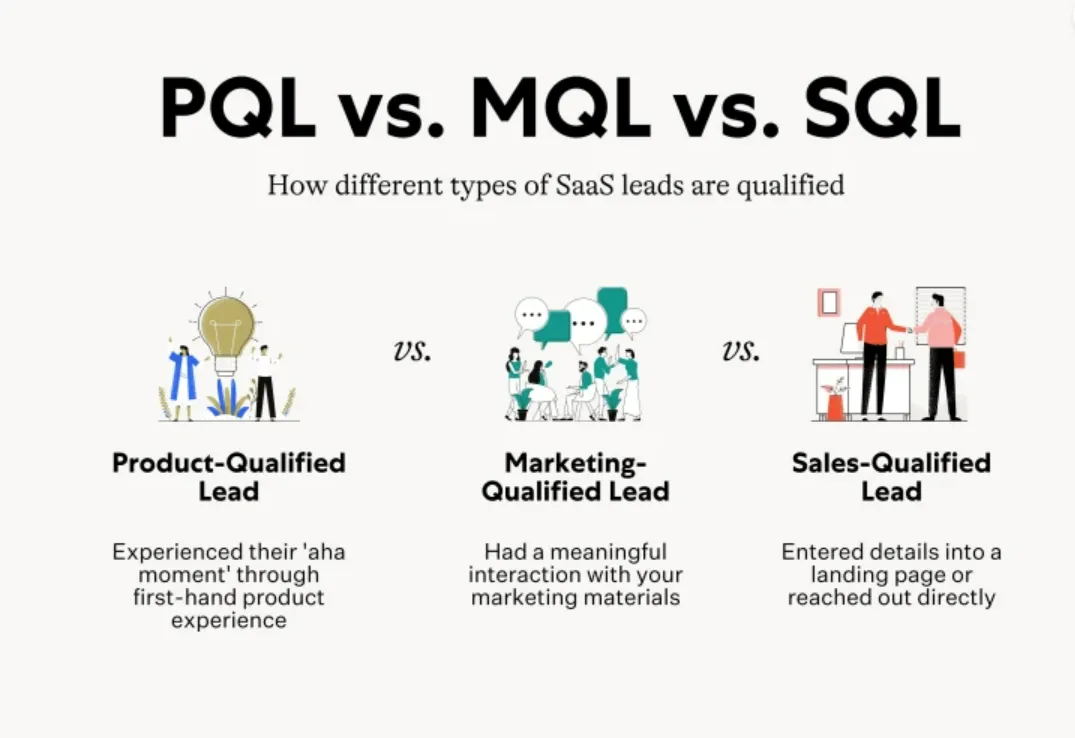
Sales Qualified Leads (SQLs): Definition and Distinction
Sales Qualified Leads (SQLs) represent a pivotal stage in the sales funnel. Unlike Marketing Qualified Leads (MQLs), SQLs are leads that the sales team has reviewed and deemed ready for direct sales engagement. Here’s what sets them apart:
- Direct Sales Readiness: SQLs are characterized by their readiness to engage in the sales process, often indicated by specific actions like requesting a product demo or directly inquiring about pricing.
- Higher Conversion Probability: SQLs typically have a higher likelihood of converting into paying customers, as they have passed stringent sales qualification criteria.
The Critical Role of Differentiating MQLs from SQLs
Understanding the distinction between MQLs and SQLs is crucial for both sales and marketing teams. This differentiation:
- Enhances Efficiency: By categorizing leads as MQL or SQL, teams can tailor their strategies accordingly. Marketing teams can focus on nurturing MQLs with marketing efforts, while sales teams can devote their time to SQLs.
- Improves Lead Quality: Regular analysis of lead behavior helps refine the criteria for MQL and SQL, improving overall lead quality and ensuring that sales representatives engage with the most promising prospects.
Transitioning Leads from MQL to SQL: A Strategic Approach
The transition of a lead from MQL to SQL is a critical step in the sales funnel, and it requires a strategic approach:
- Regular Communication: Regular dialogue between the sales and marketing teams is vital. This ensures a smooth handoff process and alignment on what constitutes a sales-ready lead.
- Scoring System Review: Regular reviews of the lead scoring system, taking into account feedback from both sales reps and marketing department insights, help in fine-tuning the MQL to SQL transition process.
Lifecycle of a Marketing Qualified Lead
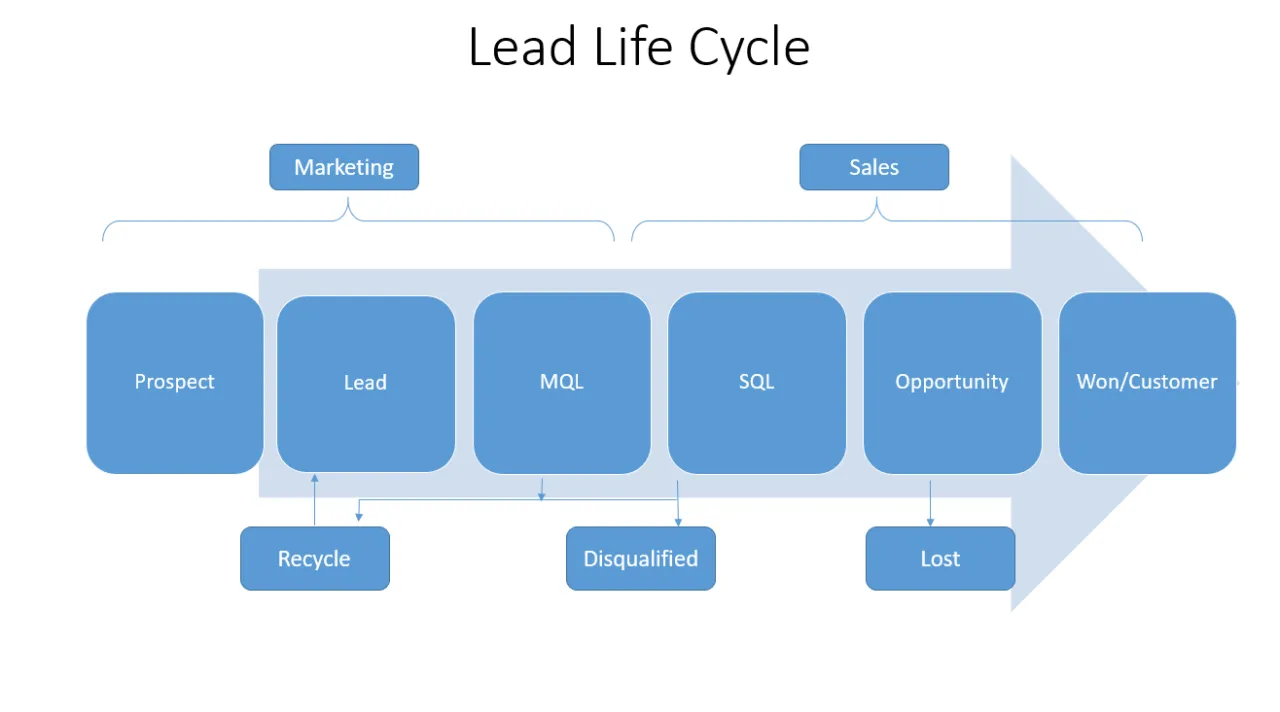
Nurturing Marketing Qualified Leads Towards Sales Readiness
Nurturing a Marketing Qualified Lead (MQL) is a nuanced process that gradually prepares the lead for the sales team.
This nurturing involves a series of targeted communications and marketing efforts, designed to educate and inform the lead about the value and applicability of the product.
For instance, using email marketing tactics, such as drip campaigns, can effectively keep the brand at the forefront of the lead's mind. By providing valuable content at each stage of the buyer's journey, MQLs are progressively guided towards sales readiness.
Collaborative Strategies for MQL Management
Successful MQL management hinges on the synergy between marketing and sales teams.
This collaboration ensures that the marketing team’s efforts in nurturing leads align with the sales team’s objectives.
Regular meetings and open communication channels are crucial for refining the handoff process. Additionally, integrating insights from sales reps about lead behavior and feedback can enhance the effectiveness of marketing strategies.
By working together, both teams can effectively move leads through the sales funnel, ensuring a higher quality of lead is passed to sales.
Sales Funnel Dynamics: From MQL to SQL Conversion
The transition from a Marketing Qualified Lead (MQL) to a Sales Qualified Lead (SQL) marks a significant shift in the sales funnel dynamics.
This conversion process should be data-driven, with a focus on lead scoring to assess the lead’s readiness for sales engagement.
Factors like engagement level with marketing assets, shown interest in specific products or services, and responses to marketing efforts play a key role in this transition.
The sales team, equipped with these insights, can then effectively approach leads with tailored strategies, increasing the likelihood of successful conversions.
Synergy Between Sales and Marketing Teams
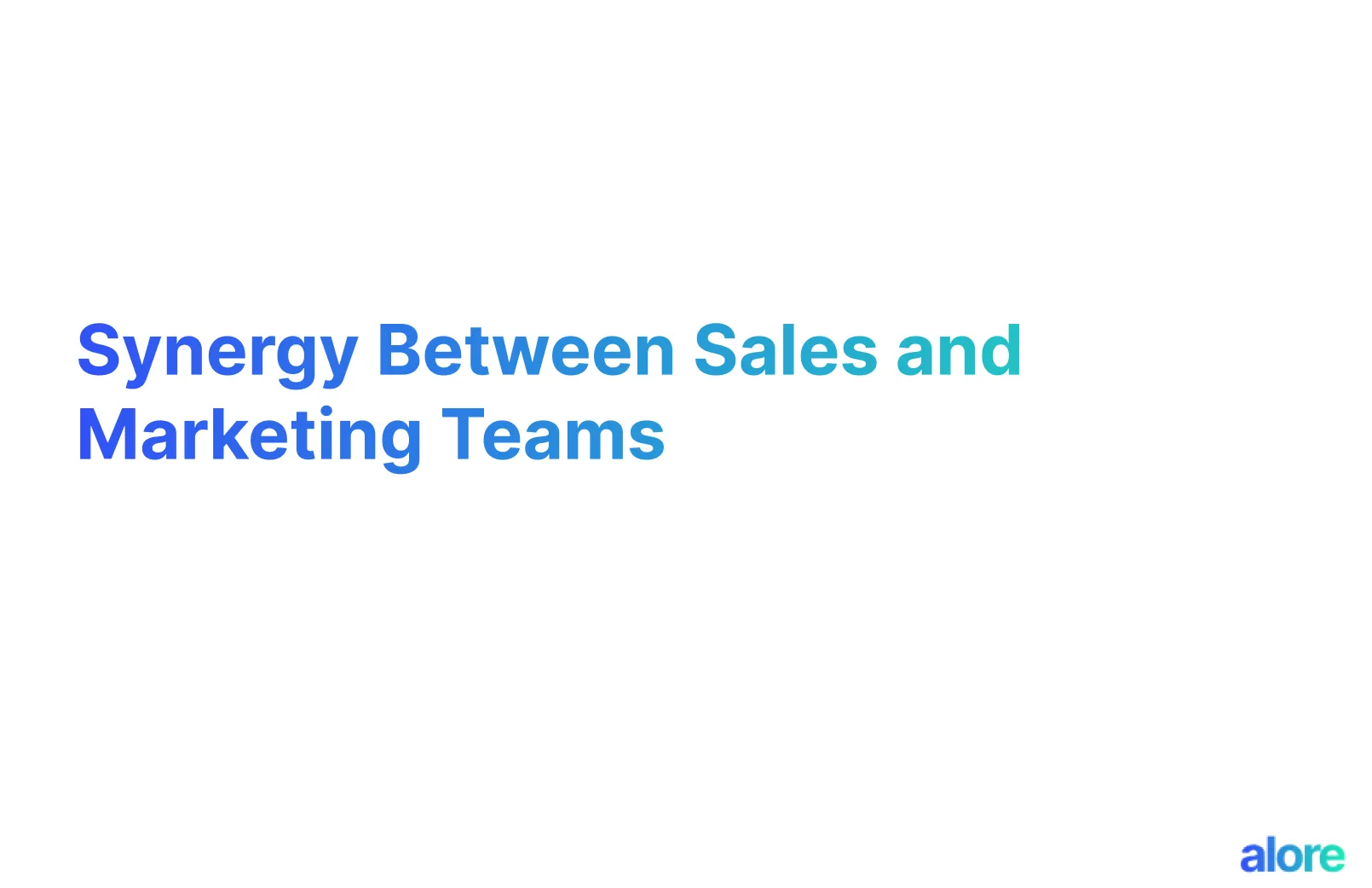
Nurturing Marketing Qualified Leads Towards Sales Readiness
Nurturing involves a series of targeted communications and marketing efforts, designed to educate and inform the lead about the value and applicability of the product.
For instance, using email marketing tactics, such as drip campaigns, can effectively keep the brand at the forefront of the lead's mind.
By providing valuable content at each stage of the buyer's journey, MQLs are progressively guided towards sales readiness.
Collaborative Strategies for MQL Management
Successful MQL management hinges on the synergy between marketing and sales teams.
This collaboration ensures that the marketing team’s efforts in nurturing leads align with the sales team’s objectives.
Regular meetings and open communication channels are crucial for refining the handoff process.
Additionally, integrating insights from sales reps about lead behavior and feedback can enhance the effectiveness of marketing strategies.
By working together, both teams can effectively move leads through the sales funnel, ensuring a higher quality of lead is passed to sales.
Optimizing MQL Strategies: Analytics and Adaptation

Data-Driven Insights for Refining MQL Criteria
In the realm of marketing, data is king. Utilizing data-driven insights is fundamental in refining Marketing Qualified Lead (MQL) criteria. Here’s how:
- Analyzing Lead Behavior: Reviewing how leads interact with your content, website, and marketing assets can offer valuable insights.
- Conversion Rate Assessment: Understanding which MQLs are converting into customers helps identify the most predictive qualifying factors.
This approach ensures that MQL criteria are continually aligned with actual customer behaviors and market trends, leading to more effective lead qualification.
Adapting MQL Strategies for Maximum Efficacy
To ensure MQL strategies remain effective, regular adaptation is essential. This involves:
- Market Trend Analysis: Stay abreast of industry trends and adjust your strategies accordingly.
- Feedback Integration: Incorporate feedback from both the sales team and MQLs themselves to refine your approach.
Utilizing Lead Intelligence and Predictive Analytics
Leveraging lead intelligence and predictive analytics can significantly enhance MQL strategies. This includes:
- Predictive Modeling: Use historical data to predict future behaviors and identify high-value leads.
- Lead Scoring Adjustments: Continuously refine lead scoring models based on predictive analytics findings.
Strategies for Increasing MQL to SQL Conversion Rates
To improve the conversion rate from MQLs to Sales Qualified Leads (SQLs), consider these strategies:
- Personalized Communication: Tailor your messaging and outreach based on the specific interests and behaviors of each MQL.
- Enhanced Engagement: Use engaging content and interactive tools to maintain the interest of MQLs throughout their journey.
Aligning MQL Strategies with Company Size and Sales Goals
Different company sizes and sales objectives require tailored MQL strategies:
- For Small Businesses: Focus on highly targeted, niche strategies that appeal to a specific audience.
- For Larger Enterprises: Leverage broader, scalable strategies that can be adjusted for different segments.
In conclusion, optimizing MQL strategies involves a mix of data-driven insights, predictive analytics, and adaptive tactics. By staying agile and responsive to both market and internal feedback, businesses can enhance their lead qualification process, leading to better alignment with sales goals and higher conversion rates.


